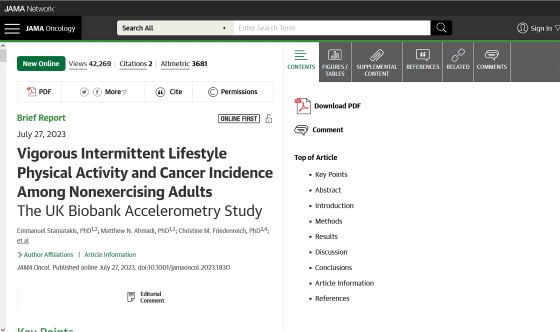3 to 4 minutes of daily exercise such as climbing the stairs, doing housework, and walking to the bus stop can reduce the risk of cancer.

Many people know that regular exercise can reduce various health risks, but many people find it difficult to set aside time for running or muscle training. A new study led by Professor
Vigorous Intermittent Lifestyle Physical Activity and Cancer Incidence Among Nonexercising Adults: The UK Biobank Accelerometry Study | Cancer Screening, Prevention, Control | JAMA Oncology | JAMA Network
https://jamanetwork.com/journals/jamaoncology/fullarticle/2807734

Climb the stairs, lug the shopping, chase the kids. Incidental vigorous activity linked to lower cancer risks
https://theconversation.com/climb-the-stairs-lug-the-shopping-chase-the-kids-incidental-vigorous-activity-linked-to-lower-cancer-risks-210288
'Structured exercise takes time, requires significant commitment, and often requires financial outlays and gym attendance. These practical issues make it prohibitive for many adults,' Stamatakis et al. Structured exercise can become unfeasible.”
On the other hand, little research has been conducted on whether accidental physical activity in daily life reduces the risk of cancer. Incidental physical activities featured here include ``walking short distances to the bus stop or convenience store,'' ``climbing stairs,'' ``carrying heavy bags after shopping,'' ``doing housework,'' and ``taking care of children.'' These include those that do not require extra time or special equipment, such as 'play with'.
Therefore, Stamatakis and his team researched ``22,398 people who had never been diagnosed with cancer and who did not do structured exercise in their leisure time'' from UK Biobank , a large biobank in the United Kingdom. We analyzed data from ``subjects''. Approximately 55% of the participants were female and the average age was 62 years old, and the participants wore activity trackers on their wrists for one week to measure their activity levels.
The research team then conducted an analysis by linking the subjects' cancer-related health records collected over a period of approximately seven years with physical activity and various other information. We analyzed the risk variation due to accidental exercise for each of 13 body parts, including breast cancer, lung cancer, liver cancer, and colorectal cancer, and also took into account factors related to cancer risk such as age, smoking, alcohol consumption, and diet. About.

The analysis revealed that although the participants did not engage in structured movements, approximately 94% of them engaged in short, brisk, accidental movements. Also, about 92% of the exercises were very short, lasting about 1 minute at most.
Even though the amount of incidental exercise was very short over the course of a day, it was found to reduce cancer risk. The research team found that people who engaged in at least 3.5 minutes of incidental exercise per day had a 17% to 18% lower overall cancer risk compared to those who did not engage in such activity, and that 4.5 minutes of incidental exercise per day Those with more than 10 minutes reported a 20-21% reduction in cancer risk.
Furthermore, the risk reduction effect was even more pronounced for cancers where the amount of exercise is known to affect the risk, such as breast cancer, lung cancer, and colorectal cancer. 3.5 minutes or more of incidental exercise per day reduced the risk of these cancers by 28-29%, and 4.5 minutes or more per day reduced the risk by 31-32%.
The study was only observational; it did not determine a causal relationship by intervening in the participants' behavior, nor could it explain the biological mechanism by which incidental exercise lowers cancer risk. However, past

The results of this study show that even if you don't have enough time for running or playing sports, you can reduce your cancer risk by accumulating about 3 to 4 minutes of exercise a day that occurs in your daily life. It shows.
Stamatakis et al. said, 'Vigorous episodic physical activity is a promising tool for cancer prevention for people who are unable or unwilling to exercise in their leisure time. Our study also highlights the potential of technology. Our results demonstrate that combining wearable devices and machine learning (used to identify vigorous, short bouts of exercise) can uncover health benefits in unknown aspects of life. 'The potential future impact of such technologies for preventing cancer and many other diseases could be enormous.'
Related Posts:
in Science, Posted by log1h_ik







